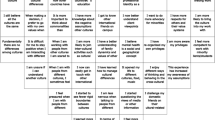Abstract
International students not only face the normal adjustment problems of young adulthood but also the adjustment to a different culture. A random sample of 100 colleges and universities was contacted. International students enrolled at the institutions completed a questionnaire designed to assess the counselling preferences of international students. Results are discussed in terms of desirable counsellor characteristics and implications for counsellor training. Suggestions are made for facilitating counselling with international students.
Similar content being viewed by others
References
Anastasi, A. (1988).Psychological Testing (5th ed.) New York: Macmillan.
Atkinson, D.R., Furlong, M.J. & Poston, W.C. (1986). Afro-American preferences for counsellor characteristics.Journal of Counselling Psychology 33: 326–330.
Atkinson, D.R., Poston, W.C., Furlong, M.J. & Mercadeo, P. (1989). Ethnic group preferences for counsellor characteristics.Journal of Counselling Psychology 36: 68–72.
Barna, L. (1983). The stress factor in intercultural relations. In D. Landis & R. Brislin (eds.),Handbook of Intercultural Training. New York: Pergamon.
Cherbosque, J. (1987). Differences between Mexican and American clients in expectations about psychological counselling.Journal of Multicultural Counselling and Development 15: 110–114.
Church, A.T. (1982). Sojourner adjustment.Psychological Bulletin 91: 540–572.
Corey, G. (1991).Theory and Practice of Counselling and Psychotherapy (4th ed.). Pacific Grove, CA: Brooks/Cole Publishing Company.
Exum, H.A. & Lau, E. Y-W. (1988). Counselling style preference of Chinese college students.Journal of Multicultural Counselling and Development 16: 84–92.
Fager, L.E. (1973). University student likelihood of seeking counselling as a function of potential type of counselling problem category, and ethnicity.Dissertation Abstracts International 33: 5490A-5491A.
Gim, R.H., Atkinson, D.R. & Kim, S.J. (1991). Asian-American acculturation, counsellor ethnicity and cultural sensitivity, and ratings of counsellors.Journal of Counselling Psychology 38: 57–62.
Hull, W.F. (1978).Foreign Students in the United States of America: Coping Behavior Within the Educational Environment. New York: Praeger.
Iodwu, A.I. (1985). Counselling Nigerian students in the United States colleges and universities.Journal of Counselling 63: 506–509.
LaFromboise, T. & Dixon, D. (1981). American Indian perceptions of trustworthiness in a counselling interview.Journal of Counselling Psychology 28: 135–139.
Leong, F.T. (1986). Counselling and psychotherapy with Asian Americans: Review of literature.Journal of Counselling Psychology 33: 196–206.
Morales, A. (1976). The impact of class discrimination and white racism on the mental health of Mexican Americans. In C.A. Hernandez, M.J. Hang & N.N. Wagner (eds.),Chicanos: Social and Psychological Perspectives (pp. 211–216). St. Louis: Mosby.
Norcross, J. & Prochaska, J. (1988). A study of eclectic (and integrative) views revisited.Professional Psychology: Research and Practice 19: 170–174.
Pedersen, P. (1991). Counselling international students.The Counselling Psychologist 19(1): 10–58.
Perez, M.S. (1975).Counselling Services at UCSC: Attitudes and Perspectives of Chicano Students. Unpublished manuscript, University of California, Santa Cruz.
Ponce, F.Q. & Atkinson, D. (1989). Mexican-American acculturation, counsellor ethnicity, counselling style and perceived counsellor credibility.Journal of Counselling Psychology 36: 203–208.
Ponterotto, J.G. & Casas, J.M. (1991).Handbook of Racial/ethnic Minority Counselling Research. Illinois: Charles Thomas Publishers.
Rogers, C. (1957). The necessary and sufficient condition of therapeutic personality change.Journal of Consulting Psychology 21: 95–103.
Ruiz, R.A., Casas, J.M. & Padilla, A.M. (1977).Culturally Relevant Behavioristic Counselling. Los Angeles: Spanish-Speaking Mental Health Research Center, University of California.
Sanchez, A.R. (1981).Chicano Students' Utilization of Counselling Services: Cultural and Institutional Factors. Unpublished master's thesis, California State University, Chico.
Smith, D. (1982). Trends in counselling and psychotherapy.American Psychologist 37: 802–809.
Sodowsky, G.R. (1991). Effects of culturally consistent counselling tasks on American and international student observers' perception of counsellor credibility: A preliminary investigation.Journal of Counselling and Development 69: 253–256.
Stewart, E.C. (1975).American Culture Patterns: A Cross-cultural Perspective. Washington, DC: Society for International Education, Training and Research.
Sue, D.W. (1987). Eliminating cultural oppression in counselling: Towards a general theory.Journal of Counselling Psychology 25: 419–428.
Sue, S. & McKinney, H. (1975). Asian-Americans in the community mental health care system.American Journal of Orthopsychiatry 45: 111–118.
Tan, H. (1967). Intercultural study of counselling expectancies.Journal of Counselling Psychology 14: 122–130.
Thomas, K.A. (1985).A comparison of Counselling Strategies Reflective of Cultural Value Orientation. Unpublished doctoral dissertation, University of Minnesota, Minneapolis.
Truax, C.B. & Carkhuff, R.R. (1967).Toward Effective Counselling and Psychotherapy: Training and Practices. Chicago: Aldine.
Vontress, C.E. (1971). Racial differences: Impediments to rapport.Journal of Counselling Psychology 18: 7–13.
Wong, A.T. (1984). Effects of client socioeconomic status, race, and acculturation on the treatment plans and expectations of Asian American therapists.Dissertation Abstracts International 45(6-B): 1929.
The Yale Daily News. (1986).Insiders Guide to the Colleges (12th ed.). New York: St. Martin's Press.
Yau, T.Y., Sue, D. & Hayden, D. (1992). Counselling style preference of international students.Journal of Counselling Psychology 39: 100–104.
Yiu, L.R. (1979). Degree of Assimilation and its effect on the preference of counselling style and on self-disclosure among Chinese-Americans in Hawaii.Dissertation Abstracts International 39(9-A): 5340–5341.
Young, M. (1992).Counselling Methods and Techniques: An Eclectic Approach. New York: Macmillan.
Yuen, R.K.W. & Tinsley, H.E.A. (1981). International and American students' expectancies about counselling.Journal of Counselling Psychology 28: 66–69.
Zikopoulos, M. (Ed.) (1991).Open Doors 1989–1990: Report on International Educational Exchange. New York: United Nations Plaza, Institute of International Education.
Author information
Authors and Affiliations
Rights and permissions
About this article
Cite this article
Bradley, L., Parr, G., Lan, W.Y. et al. Counselling expectations of international students. Int J Adv Counselling 18, 21–31 (1995). https://doi.org/10.1007/BF01409601
Issue Date:
DOI: https://doi.org/10.1007/BF01409601



